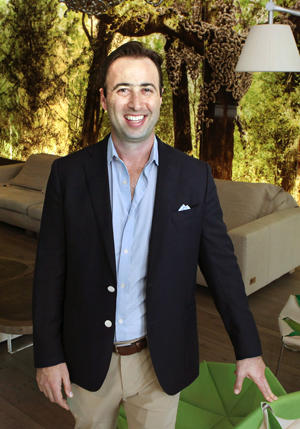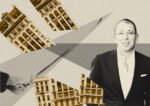Trending
The Closing: Arnaud Karsenti

What drives developer Arnaud Karsenti? For one, this bit of wisdom: Anything worth having must be earned. His persistence during the recession is a case in point. The 40-year-old founder of 13th Floor Investments launched his Miami-based private real estate investment and development firm in 2008, focusing on distressed assets amid the downturn. When the market improved, the company turned to development, and it now has about $1.7 billion in condominiums, mixed-use and multifamily projects, in addition to single-family home communities in the works across the state. Karsenti prides himself “on being someone that looks for opportunities where others don’t.” He sat down with TRD to discuss everything from his college business — now owned by U-Haul — to the recent launch of his 1010 Brickell condo project.
DOB: May 19, 1978
Hometown: Paris
Lives in: Coral Gables
Family: Wife Rebecca, an OB/GYN, and three children: Gabriel, 9; Sarah, 7; and Ari, 5
What was your childhood like? I was born in Paris, and I would describe my childhood as very independent but very meritocratic in the sense that I was taught very early on to earn things. My parents were first-generation immigrants, and so I think that was a big theme in my childhood, coming to America and building our lives as a family together … When I was 3 we came to Miami. [My parents] were kind of small-time entrepreneurs. My father was in the dry cleaning business, and my mother would import fashion accessories from Europe and sell them in the States.
Where did you meet your wife? In fourth grade. She was friends with my next-door neighbor and she was a catch back then, even in fourth grade, but she was way too cool for me. I didn’t get a real shot at dating her until later in college. We both went to Duke. We became friends. I always liked her, and I was never shy about that. The chase of courting Rebecca was — what did I say during my birthday recently to her — that the chase was the best ride of my life. You see, it ties back into my childhood. What has been instilled in me since I was a kid was earning stuff. I feel like anything that you don’t earn almost is not worth it.
What was your first job? I started Collegeboxes as a little class pet project [at Duke], and it turned into a real little business. The concept was to provide shipping and storage solutions to students, primarily when they were away for the summer. We would pick up their stuff, store it over the summer and then bring it back to them. I spent four years doing that after college … We sold it to basically a competitor and then that competitor had backing from a venture capital firm and they ended up selling it. Ultimately now it is owned by U-Haul.
How did you switch over to real estate? I got involved as a hobby, by bootstrapping and knocking on doors in Little Havana, urban areas of Miami. I started buying little houses and little shopping centers — nothing that today would be newsworthy, but it was a lot of fun … Then a lot of things happened all at the same time. My wife applied for her residency, and she wanted to go up North. I applied to business school, I sold Collegeboxes, we got married. But I was stuck with all this real estate. I ended up selling most of it, which at the time felt painful because I really was excited about it but in hindsight was a blessing because, number one, it provided me with some start-up capital, but what it really did is it saved me from the downturn that was about to happen, which I didn’t predict by any stretch.
How did you go from that point to your next step in real estate? I decided after business school to get back into real estate and to do it more formally like as a company, and that’s kind of how I started 13th Floor as you know it … From 2008 to 2011 or 2012, 13th Floor formed as a distressed, opportunistic investment company. We bought maybe $100 million or $200 million of property in that time period … I like to say babies bring good luck. They do, because as soon as my wife was pregnant with Gabriel, that was when we started getting our first deals. I was one of the few active players that was actually buying stuff, because a lot of the big names that you know that were active were really saddled with their own issues, so they were spending their time fixing their problems, which I completely understand. I had no problems to solve, because I was looking for a problem.
Why did you name the company 13th Floor Investments? Because of an inside joke with my best friend. We were going down the elevator one day in some hotel in Las Vegas, and he said to me, “Look at all that empty, wasted space between the 12th and 14th floors.” The next day I told him, I think it’s a good idea for a name for my company because I kind of pride myself on being someone that looks for opportunities where others don’t. Maybe there is a 13th floor, and we’ll try to find it.
Where do you see the condo market going in the next couple of years? If you are offering a commodity, I think it’s tough. Right now I wouldn’t want to build another 500 units on Brickell, even though it’s a great market. There is just a lot of product, unless you are right on the water or something to that effect. I think the condo business is just a little thinner. But we are still selling at the Harbour. We’re not selling 50 units a month like we were when we first launched, but we are selling a unit a week, two units a week … So I am optimistic, I really am, and I would not have given you that answer even if you had asked me three months ago.
What is the best advice you have ever received? It was given to me as a very difficult criticism at the time. I was 28. It was at a wedding, and the husband of one of my business school classmates very rudely told me that I was all over the place, I didn’t know what I was talking about, and I needed to focus on one thing. The analogy he gave me was the deeper you dig into this well, the bigger the reservoir of oil is at the bottom, versus scratching all these surfaces and getting nowhere. So, I think what he was really telling me is stop fooling around and do one thing and do it well and the rest will come to you later. And he was right.




